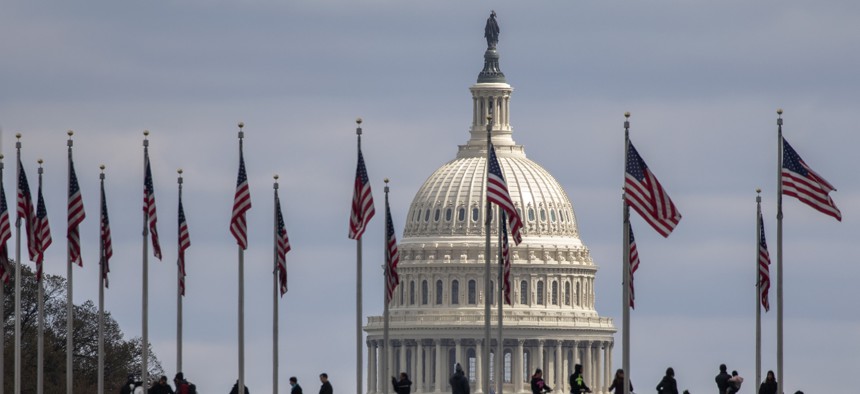Funding to Offset Local Government Budget Losses is Key to Next Aid Package, House Speaker Says

People walk among U.S. flags with the U.S. Capitol in the background, Sunday, March 15, 2020, in Washington. AP Photo/Jacquelyn Martin

Connecting state and local government leaders
It would be a shift from the CARES Act, which restricts state and local aid to expenses associated with the coronavirus pandemic.
Funding that could be used to offset state and local government tax revenue losses from the economic crash the coronavirus outbreak has caused is “a very important piece” of ongoing negotiations over a pending emergency relief bill, House Speaker Nancy Pelosi said Thursday.
An “interim” bill that would include replenished funding for the Paycheck Protection Program, which offers support to small businesses, and other stimulus initiatives could be on the House floor by the end of the month, Pelosi said in a conference call with reporters. Democrats last week released a list of their priorities for an interim coronavirus package that includes $150 billion in funding for state and local governments that could be used to manage the public health crisis and “mitigate lost revenue.”
“The fact that there is revenue lost as well as additional costs to fight the pandemic necessitates that we allocate more resources to state and local government,” Pelosi said, providing an overview of ongoing negotiations with Senate Republicans and Treasury Secretary Steven Mnuchin. Congressional leaders held initial talks over next steps with the Trump administration Wednesday and are going back for another round Thursday afternoon.
The CARES Act, signed into law last month, established a $150 billion Coronavirus Relief Fund to provide payments to states and local governments with populations over 500,000. But the law restricts use of the funds to “necessary expenditures” due to the public health emergency and incurred between March 1 and Dec. 30, 2020.
State and local governments have complained that with stay-at-home orders in place, millions of workers filing for unemployment, and the U.S. economy at a standstill, that they need money that can be used to offset a loss in revenues.
A recent survey of city government officials found that 88% of cities expect a budget shortfall this year due to the impact of the coronavirus pandemic on the economy. More than half of city leaders said they expect to have to cut public services as a result of those budget shortfalls.
Before addressing the financial needs of state and local governments, Republican leaders have focused on the need to replenish funding being made available to small businesses. The Paycheck Protection Program, which distributed $350 billion in small business loans that can be forgiven if employers do not lay off workers, ran out of money Thursday. Republican-led efforts to add another $250 billion to the program were rebuffed by Democrats last week.
“This did not have to happen,” said Senate Majority Leader Mitch McConnell and House Republican Leader Kevin McCarthy in a joint statement issued Thursday. “Last Thursday, Senate Republicans tried to pass a narrow and clean bill that would have simply put more money into this critical program without changing any of the underlying policies that passed the Senate and the House unanimously. Democrats blocked it.”
Pelosi said Democrats support providing more funding for small businesses, but they say that hospitals and local governments also have an urgent need for financial aid and should be included in discussions about an interim bill.
“They are in the hole, they have no cash flow coming in,” she said.
While the Paycheck Protection Program funding has already run out, the Treasury Department just began distributing money allocated through the CARES Act for state and local governments this week. Pelosi said Democrats want to see data on how money for the small business program is being allocated and used before committing to more funding.
Andrea Noble is a staff correspondent with Route Fifty.

NEXT STORY: Counties Say Virus Relief Fund is Shorting Them by Billions




